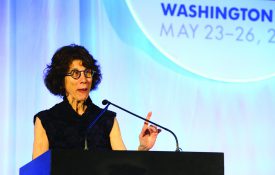-
APS Past President Gordon H. Bower (1932-2020)
It is with great sorrow that we mark the passing of APS Past President Gordon H. Bower on June 17, 2020. A Charter Member of APS, he served as President from 1991-1993 and was a longtime psychology professor at Stanford University, where he influenced generations of scientists throughout the field. Among his many recognitions is the U.S. National Medal of Science, which he received in 2005. See Bower's 2009 Inside the Psychologist’s Studio interview. See this longer tribute in the October Observer. Bower’s student Mark Gluck, of Rutgers University, wrote the tribute that follows.
-

Barbara Tversky Receives Kampé de Fériet Award
APS Past President Barbara Tversky has received the Kampé de Fériet Award for her research on memory, thought, spatial models, and event perception.
-

New Research in Psychological Science
A sample of research on cultural distance, gossip and lying, skill learning, air pollution and anxiety, and the reliability of task-functional MRI measures.
-
The Hard Truth Of Poker — And Life: You’re Never ‘Due’ For Good Cards
For many years, my life centered around studying the biases of human decision-making: I was a graduate student in psychology at Columbia, working with that marshmallow-tinted legend, Walter Mischel, to document the foibles of the human mind as people found themselves in situations where risk abounded and uncertainty ran high. Dissertation defended, I thought to myself, that’s that. I’ve got those sorted out. And in the years that followed, I would pride myself on knowing so much about the tools of self-control that would help me distinguish myself from my poor experimental subjects.
-
From Behind the Coronavirus Mask, an Unseen Smile Can Still Be Heard
In many places all over the world, a mask has become mandatory to slow down the spread of SARS-CoV-2. People wear one on the bus or train, during shopping trips or at doctor’s appointments. How does that practice change basic communication? Does a face covering impair social interaction? Facial expression and emotion researcher Ursula Hess, deputy dean for international affairs at the faculty of life sciences at Humboldt University of Berlin, provides some answers in this interview with Scientific American’s German-language sister publication Spektrum der Wissenschaft.
-
How Racial Bias Works — and How to Disrupt It
TED Talk with APS President Elect Jennifer L. Eberhardt Our brains create categories to make sense of the world, recognize patterns and make quick decisions. But this ability to categorize also exacts a heavy toll in the form of unconscious bias. In this powerful talk, psychologist Jennifer L. Eberhardt explores how our biases unfairly target Black people at all levels of society -- from schools and social media to policing and criminal justice -- and discusses how creating points of friction can help us actively interrupt and address this troubling problem.

